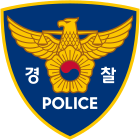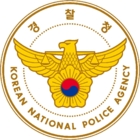Korean National Police Agency
| Korean National Police Agency |
|
|---|---|
| Korean name | |
| Hangul | 경찰청 |
| Hanja | |
| Revised Romanization | Gyeongchalcheong |
| McCune–Reischauer | Kyŏngch'alch'ŏng |
 |
|
 |
|

Badge of a South Korean police officer
|
|
 |
|
| Common name | Korean National Police |
| Abbreviation | KNPA |
| Jurisdictional structure | |
| National agency | South Korea |
| Operations jurisdiction | South Korea |
| General nature | • Local civilian agency |
| Headquarters | Migeun-dong, Seodaemun, Seoul |
| Police officers | 101,108 (2010) |
| Minister responsible |
|
| Agency executive |
|
| Local police agencys |
17
|
| Website | |
| Official website | |
The Korean National Police Agency (KNPA), also known as the Korean National Police (KNP), is one of a few police organizations in South Korea and is run under the Ministry of Government Administration and Home Affairs. As a national police force it provides all policing services throughout the country. The National Park Services also have their own police organizations, as does the Ministry of Land, Infrastructure and Transportation to police the railroad system.
The NPA is headquartered in Migeun-dong, Seodaemun, Seoul. The agency is divided into 17 local police agencies, including the Seoul Metropolitan Police Agency. Local police agencies are not independent of the national police. There were 106,898 police officers as of 2015[update].
Following the Saenuri Party's victory during the 2012 election the jurdistiction of the police in investigations was weakened, and that of the prosecutors strengthened.
The Combat Police division of the National Police Agency is an anti-riot paramilitary unit, of military conscripts. Its members deal with counterintelligence and riot policing. It was established in 1967, during the Third Republic. Each battalion is assigned to a municipal police agency in the country. In their riot gear, they were once identified by their signature metal riot shields which are numbered such as "1001" or "1011", and on their helmets with the NPA emblem. Now the police use modern tactical clear plastic shields and now deploy high-powered water cannons to minimize civilian injuries. Two weeks of training are taken by each draftee.
...
Wikipedia
